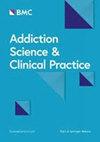The Functional-Cognitive and Sensory Treatment (F-CaST) to improve rehabilitation outcomes of individuals with substance use disorder: a study protocol for a mixed-method randomized controlled trial
IF 3.7
2区 医学
Q1 SUBSTANCE ABUSE
引用次数: 0
Abstract
Substance use disorder (SUD) is associated with executive function (EF) deficits and sensory modulation dysfunction (SMD). Yet, these deficits are not addressed therapeutically. This study aims to examine the effectiveness of the Functional-Cognitive and Sensory Treatment (F-CaST) compared to standard care to improve everyday performance and behavior and length of stay at the therapeutic community (TC) in individuals with SUD. In addition, to assess the improvement in EF, sensory modulation, participation, self-efficacy, life satisfaction, and use of strategies within and between groups. Satisfaction with F-CaST will also be assessed. Forty-eight participants from a community of men in a TC, aged 18–45 years will be randomly allocated to (i) F-CaST—(experimental group) providing sensory and EF strategies for improving daily function; (ii) standard care (control group) as provided in the TC. Assessments will be conducted by assessors blind to group allocation at 4 time points: T1- pre-intervention; T2- post-intervention; T3- 1-month follow-up; and T4- 3-month follow-up. Primary outcome measures will be everyday performance, assessed by the Canadian Occupational Performance Measure (COPM), behavior and length of stay in the TC; secondary outcome measures will assess EF, SMD. Semi-structured in-depth qualitative interviews will be conducted at T1, T2 and T4. We hypothesize that F-CaST will lead to improved everyday performance and longer length of stay in the TC, compared to the control group. If F-CaST will prove to be effective, cognitive and sensory strategies may be incorporated as an adjunctive intervention in SUD rehabilitation. Trial registration: ClinicalTrials.gov NCT05647863 Registered on 13 December 2022, https://classic.clinicaltrials.gov/ct2/show/NCT05647863 .功能认知和感官治疗(F-CaST)改善药物使用障碍患者的康复效果:混合方法随机对照试验的研究方案
药物使用障碍(SUD)与执行功能(EF)缺陷和感觉调节功能障碍(SMD)有关。然而,这些缺陷并未得到治疗。本研究旨在考察功能认知和感官治疗(F-CaST)与标准护理相比,对改善 SUD 患者的日常表现和行为以及在治疗社区(TC)停留时间的效果。此外,还要评估组内和组间在EF、感觉调节、参与、自我效能、生活满意度和策略使用方面的改善情况。还将评估对 F-CaST 的满意度。来自社区的 48 名年龄在 18-45 岁的男性参与者将被随机分配到 (i) F-CaST(实验组),该组提供改善日常功能的感觉和 EF 策略;(ii) 社区提供的标准护理(对照组)。评估将由对组别分配保密的评估员在 4 个时间点进行:T1-干预前;T2-干预后;T3-1个月随访;T4-3个月随访。主要结果指标将是日常表现(通过加拿大职业表现测量法(COPM)评估)、行为和在 TC 中的逗留时间;次要结果指标将评估 EF 和 SMD。我们将在 T1、T2 和 T4 期进行半结构式深度定性访谈。我们假设,与对照组相比,F-CaST 将改善患者的日常表现,延长其在治疗中心的逗留时间。如果 F-CaST 被证明是有效的,则认知和感官策略可作为一种辅助干预措施纳入 SUD 康复治疗中。试验注册:ClinicalTrials.gov NCT05647863 注册日期:2022年12月13日,https://classic.clinicaltrials.gov/ct2/show/NCT05647863 。
本文章由计算机程序翻译,如有差异,请以英文原文为准。
求助全文
约1分钟内获得全文
求助全文
来源期刊

Addiction Science & Clinical Practice
Psychology-Clinical Psychology
CiteScore
3.90
自引率
10.80%
发文量
64
审稿时长
28 weeks
期刊介绍:
Addiction Science & Clinical Practice provides a forum for clinically relevant research and perspectives that contribute to improving the quality of care for people with unhealthy alcohol, tobacco, or other drug use and addictive behaviours across a spectrum of clinical settings.
Addiction Science & Clinical Practice accepts articles of clinical relevance related to the prevention and treatment of unhealthy alcohol, tobacco, and other drug use across the spectrum of clinical settings. Topics of interest address issues related to the following: the spectrum of unhealthy use of alcohol, tobacco, and other drugs among the range of affected persons (e.g., not limited by age, race/ethnicity, gender, or sexual orientation); the array of clinical prevention and treatment practices (from health messages, to identification and early intervention, to more extensive interventions including counseling and pharmacotherapy and other management strategies); and identification and management of medical, psychiatric, social, and other health consequences of substance use.
Addiction Science & Clinical Practice is particularly interested in articles that address how to improve the quality of care for people with unhealthy substance use and related conditions as described in the (US) Institute of Medicine report, Improving the Quality of Healthcare for Mental Health and Substance Use Conditions (Washington, DC: National Academies Press, 2006). Such articles address the quality of care and of health services. Although the journal also welcomes submissions that address these conditions in addiction speciality-treatment settings, the journal is particularly interested in including articles that address unhealthy use outside these settings, including experience with novel models of care and outcomes, and outcomes of research-practice collaborations.
Although Addiction Science & Clinical Practice is generally not an outlet for basic science research, we will accept basic science research manuscripts that have clearly described potential clinical relevance and are accessible to audiences outside a narrow laboratory research field.
 求助内容:
求助内容: 应助结果提醒方式:
应助结果提醒方式:


